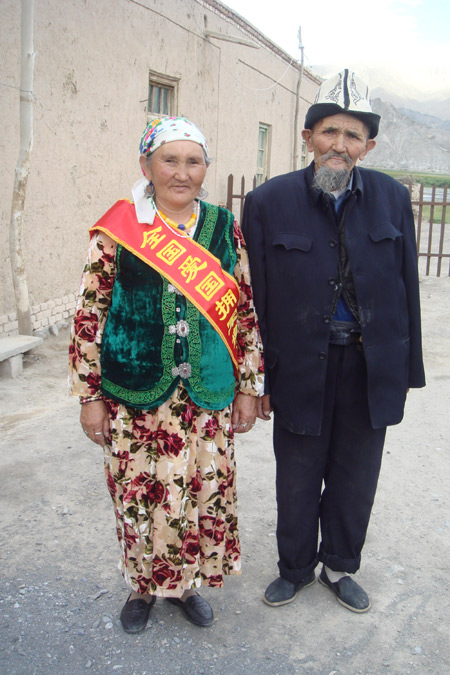By Lisa Carducci
I would like to dedicate a chapter on the extraordinary mountains that form the major part of the Kizilsu Kirkiz Autonomous Prefecture. But such a chapter can't be written. The unspeakable magnificence of the landscape can only be experienced. Thousands of photos would not accurately reflect the fascinating rocky landforms, each one more beautiful than another, that I admired along the 500 km travelled in this prefecture, which is called "Kezhou" in short.
|

|
|
Burmakan and her husband [Foreign Languages Press]
|
When I arrived in Kezhou, the legendary woman I came to interview was absent. On the eve of the 80th anniversary of the People's Liberation Army, the volunteer and unarmed "military" had been invited to Urumqi where she would be highly honored with the "national model of the people and the army" title. Delayed the next day because she was a distinguished guest for the celebration of the PLA anniversary, Burmakan was not able to be on time for our appointment. She was impatient, thinking that I was waiting for her, but I would not miss the opportunity of meeting her and, in any case, I always have enough to occupy my time.
Burmakan had gone to Urumqi by train, a 36-hour route, of which 12 hours were due to flooding on the way. Back by plane, she landed at 15:00 and asked the driver to drive her immediately to my hotel in Wuqia, where she greeted me and embraced me like an old friend whom she hadn't seen for years.
I wanted to interview her in her environment, so we left by car on that incredible road, which had been paved 10 years ago, crossing rocky mountains for hundreds of kilometres, to the Kirkiz village of Jigen Township, where Burmakan had spent her life. In our two-hour drive, we did not see any houses; I felt as though I had entered a dream in the core of civilization.
On our arrival, Burmakan and her husband, Toiqibiek, 80, showed us the new house that had been completed just one month before and that still smelled of fresh paint, but I chose to do the interview in the old house. Burmakan agreed happily.
Toiqibiek and his daughter-in-law kept busily slicing different kinds of melons and covering the kang with a variety of pastries, pouring ma nai or fermented horse milk with a low amount of alcohol into a large bowl for each guest. Before touching any food, one must wash his or her hands over a pewter basin while a family member pours water from a jar. Once the hands are washed, one must avoid shaking them and sponge them off with the proffered embroidered towel.
Burmakan, 65, is very lively; she likes to talk even if others don't understand her language, and she smiles constantly. She complained laughingly about the heat in Urumqi while in her village, at an altitude of 3,200 m, a light wool sweater is necessary in the evening. And there she was adding to a box of her collection of certificates and trophies the red and golden banner she had slung across her chest from Urumqi. In recent years, as she often left her native village, she can understand a little more Chinese but doesn't speak it. Thus, Toktonur, whom I mentioned before, waited for us there. I had asked for an interpreter of the Kirkiz mother language to translate to Chinese, not the reverse.
Burmakan was born to a rural family; she is the youngest of two boys and two girls. She never went to school and neither did her three sons and two daughters, who are all unilingual and illiterate. Burmakan can write her name and nothing else. But her 11 grandchildren attend or will attend school and have been bilingual since the first grade. The one-year-old grandson who played with my earrings and my pen is called a name meaning "journalist." Here is the story.